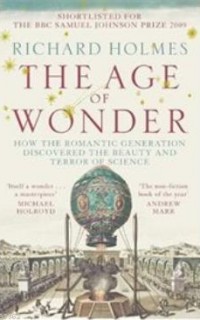
Age of Wonder; How the Romantic Generation Discovered the Beauty and Terror of Science
ISBN: 9780007149537
Okuma Durumu
Kitap Hakkında
Shortlisted for the BBC Samuel Johnson Prize for Non-Fiction Shortlisted for the Royal Society Prize for Science Book Richard Holmes, prize-winning biographer of Coleridge and Shelley, explores the scientific ferment that swept across Britain at the end of the 18th century in his ground-breaking new biography 'The Age of Wonder'. 'The Age of Wonder' is Richard Holmes's first major work of biography in over a decade. It has been inspired by the scientific ferment that swept through Britain at the end of the eighteenth century, 'The Age of Wonder' and which Holmes now radically redefines as 'the revolution of Romantic Science'. The book opens with Joseph Banks, botanist on Captain Cook's first Endeavour voyage, stepping onto a Tahitian beach in 1769, hoping to discover Paradise. Many other voyages of discovery swiftly follow, while Banks, now President of the Royal Society in London, becomes our narrative guide to what truly emerges as an Age of Wonder. Banks introduces us to the two scientific figures that dominate the book: astronomer William Herschel and chemist Humphry Davy. Herschel's tireless dedication to the stars, assisted (and perhaps rivalled) by his comet-finding sister Caroline, changed forever the public conception of the solar system, the Milky Way galaxy and the meaning of the universe itself. Davy first shocked the scientific community with his near-suicidal gas experiments in Bristol, then went on to save thousands of lives with his Safety Lamp and established British chemistry as the leading professional science in Europe. But at the cost, perhaps, of his own heart. Holmes proposes a radical vision of science before Darwin, exploring the earliest ideas of deep time and deep space, the creative rivalry with the French scientific establishment, and the startling impact of discovery on great writers and poets such as Mary Shelley, Coleridge, Byron and Keats. With his trademark sense of the human drama, he shows how great ideas and experiments are born out of lonely passion, how scientific discoveries (and errors) are made, how intense relationships are forged and broken by research, and how religious faith and scientific truth collide. The result is breathtaking in its originality, its story-telling energy, and not least, in its intellectual significance.
Yazar

Yazar
Richard Holmes
Profili Görüntüle
3 kitap
Değerlendirmeler (0)
Değerlendirme yapmak için giriş yapmalısınız
Giriş YapHenüz değerlendirme yapılmamış
Okuyanlar (0)
Henüz kimse bu kitabı eklememmiş